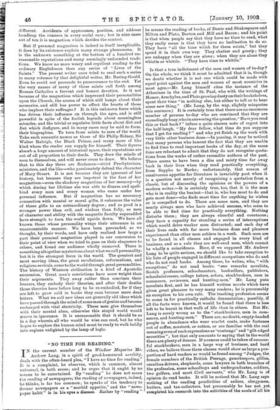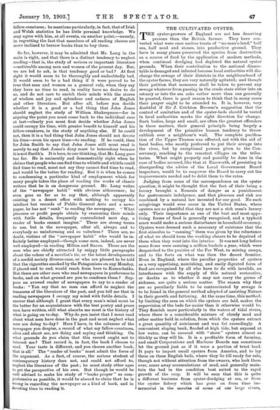"NO TIME FOR READING."
IN the current number of the Windsor Magazine Mr. Andrew Lang, in a spirit of good-humoured acerbity, deals with the often-beard plea, "I have no time for reading." It is a complaint, he observes, which is common, almost universal, in both sexes; and be urges that it ought by no means to be entertained. By "reading" he does not mean the reading of newspapers; the reading of newspapers, indeed, he thinks, is far too common; he speaks of the tendency to devour newspapers as a " morbid appetite," and the " news- paper habit" is in his eyes a disease. Rather by "reading"
•
different. Accidents of appearance, position, and address he means the reading of books, of Dante and Shakespeare and handicap the runners in every social race; but in nine cases Milton and Plato, Burton and Mill and Bacon; and his point
out of ten it is magnetism which decides the contest. is that when people say that they have no time to read, what they really mean is that they have no inclination to do sp. They have "all the time which for them exists," but they spend it in their own way. They chatter and gossip ; they are unhappy when they are alone ; when they are alone they whistle or whittle. "They have time to whittle."
Is that a true indictment of the men and women of to-day? On the whole, we think it must be admitted that it is, though we doubt whether it is not one which could be made with equal point against the men and women of most countries in most ages,—Mr. Lang himself cites the instance of the Athenians in the time of St. Paul, who with the writings of Homer, Aeschylus, and Plato growing dusty on their bookshelves, spent their time "in nothing else, but either to tell or to hear some new thing." (Mr. Lang, by the way, slightly misquotes this sentence.) It is certainly true that there are an enormous number of persons to-day who are convinced that they are exceedingly busy,who in answering the question," Have you read this or that book ? " infuse a quite sincere note of regret into the half-laugh, "My dear fellow, what time do you suppose that I get for reading ? " and who yet finish up the week with very little other business done.—In passing, it may be noticed that many persons who lament the fact that they are unable to find time to read important books of the day, at the same time are reluctant to admit that they do not recognise quota- tions from the works of rather recondite authors of the past. There seems to have been a dim and misty time far away back in their lives when they read practically everything, from Sappho to Burke; unfortunately, that season of omnivorous appetite for literature is invariably past when it is a question not merely of recognising a quotation from a classic, but of discussing the opinions or the powers of a modern writer.—It is certainly true, too, that it is the man who is in reality the busiest—that is, who has most to do and gets most done—who finds most time for anything he wishes or is compelled to do. There are some men, and they are nearly always men who have achieved success, who seem to be able to find time for practically everything. Nothing disturbs them; they are always cheerful and courteous; they have a capacity for standing a series of interruptions which would drive weaker men distracted; and each day of their lives ends with far more business done and pleasure experienced than other men achieve in a week. Such men are to be found in all classes and engaged in every kind of business, and as a rule they are well-read men, which cannot be wholly a coincidence. Here, if we supposed Mr. Andrew Lang to be quite serious, we should like to take exception to his lists of people engaged in different occupations who do and who do not read books. Among those, he writes, who, " with exceptions," do not read books, " one remarks novelists, Scotch professors, schoolmasters, booksellers, publishers, schoolmistresses, college tutors, actors, stockbrokers, men in commerce, reviewers, and hunting-men." Mr. Lang puts novelists first, and he has himself written novels which have given great pleasure to very many readers; he is presumably an exception to his own rule. The teaching profession seems to come in for practically catholic denunciation ; possibly, if all the facts were known, it would be found that there is less left to be learnt in that walk of life than in others. But Mr. Lang is surely wrong as to the " stockbrokers, men in com- merce, and hunting-men." There are, no doubt, empty-headed people in abundance who wear scarlet coats, make fortunes out of coffee, mustard, or cotton, or are familiar with the real meaning even of such expressions as "contango" and "gilt-edged securities" ; but that only amounts to saying that in the world there are plenty of dunces. If a census could be taken of success- ful stockbrokers, men in a large way of business, and hard riders, we believe those three classes would show as large a pro- portion of hard readers as would be found among "Judges, the female members of the British Peerage, gamekeepers, gillies, omnibus-drivers, shepherds, some lawyers in both branches of the profession, some schoolboys and undergraduates, soldiers, two golfers, and most Civil servants," who Mr. Lang is of opinion do read books. It will be noticed that Mr. Lang says nothing of the reading proclivities of sailors, clergymen, butlers, and tax-collectors, but presumably he has not yet. completed his research into the activities of the souls of all his
fellow-creatures ; he mentions particularly, in fact, that of Irish and Welsh statistics he has little personal knowledge. We may agree with him, at all events, on another point,—namely, in regretting the fact that members of all reading classes are more inclined to borrow books than to buy them.
So far, however, it may be admitted that Mr. Lang in the main is right, and that there is a distinct tendency to neglect reading—that is, the study of serious or important literature —noticeable among men and women of the present day. But, we are led to ask, is that tendency good or bad ? At first sight it would seem to 'be thoroughly and undoubtedly bad. It would seem to be a bad thing if it were proved to be true that men and women as a general rule, when they say they have no time to read, in reality have no desire to do so, and do not care to enrich their minds with the stores of wisdom and joy and splendour and sadness of English and other literature. But after all, before you decide whether it is a good or a bad thing that John Jones should neglect the study of William Shakespeare—for in arguing the point you must come back to the individual case at last—clearly you must first decide whether John Jones could occupy his time, with greater benefit to himself and his fellow-creatures, in the study of anything else. If he could not, then it is a bad thing that John Jones should not devote his time—even his spare time—to reading. If he could, then for John Smith to say that John Jones still must read is merely to say that Jones's doxy must be heterodoxy because it is not Smith's. It is here, to our thinking, that Mr. Lang goes too far. .He is eminently and demonstrably right when he claims that people who can find time to whistle and whittle could find time to read, must not say they cannot find time to read, and would be the better for reading. But it is when he comes to condemning a particular kind of employment which for many people takes the place of reading the works of classic writers that he is on dangerous ground. Mr. Lang writes of the " newspaper habit " with obvious abhorrence ; he even goes so far as to say that, although apparently existing in a desert office with nothing to occupy his intellect but records of Public General Acts and a news- paper, he has not " sunk " to reading the newspaper. " What pleasure or profit people obtain by cramming their minds with futile details, frequently contradicted next day, a reader of books cannot imagine." These are strong terms to use, but is the newspaper, after all, always and to everybody so nninforming and so valueless ? There are, no doubt, victims of the "newspaper habit" who would be in- finitely better employed—though some men, indeed, are never well employed—in reading Milton and Bacon. Those are the men who are chiefly attracted by snippy little paragraphs about the colour of a novelist's tie, or the latest developments of a sordid society divorce-case, or who are pleased to be told that the cigarettes smoked by the Patagonians on any Monday, if placed end to end, would reach from here to Kamschatka. But there are other men who read newspapers in preference to books, and on what ground are you to condemn them ? Sup- pose an avowed reader of newspapers to say to a reader of books : " You say that no man can afford to neglect the treasures of the literature of the past, and you tell me that in reading newspapers I occupy my mind with futile details. I answer that although I grant that every man's mind must be the better for an acquaintance with the best poetry and prose men have written, still what absorbs me most is the history of what is going on to-day. Why do you insist that I must read about what men have done in the past and must neglect what men are doing to-day ? Here I have, in the columns of the newspaper you despise, a record of what my fellow-creatures, alive and about me, are doing and saying and thinking. On what grounds do you claim that this record ought not to interest me ? That record is, in fact, the book I choose to read. Your taste is different, and you choose another book, that is all." The " reader of books " must admit the force of the argument. As a fact, of course, the serious student of contemporary history does not, and could not afford to, neglect the literature of the past ; he must study other ages to get the perspective of his own. But though he would be well advised to make his study of "books proper" as com- prehensive as possible, it would be absurd to claim that he is wrong in regarding the newspaper as a kind of book, and in devoting time to reading it.







































 Previous page
Previous page